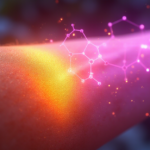Studying memory development in neuroscience, I have seen the amazing chemical dance produced and preserved by our memories. Memory’s chemistry is complicated cascades of molecular impulses physically altering our neuronal connections. By means of protracted laboratory studies of synaptic plasticity, I have seen how many neurotransmitters and proteins cooperate to encode events into enduring memories. From the first sensory input to the long-term information storage, this essay investigates the intriguing chemical mechanisms involved in our forming of new memories. Investigating memory improvement has shown how several elements, like nutrition and sleep, affect these molecular reactions. We will look at how aging influences these molecular systems and how various forms of memories entail different chemical routes. Based on our knowledge of memory chemistry, the paper explores innovative studies on memory-related diseases and possible treatment modalities. By means of investigating the junction of chemistry and cognition, readers will get profound understanding of how molecularly produced, stored, and accessed their memories are.
Table of Contents
- The Molecular Mechanisms of Memory Formation
- Chemical Factors Affecting Memory Strength
- Future Frontiers in Memory Enhancement
- Extra’s:
The Molecular Mechanisms of Memory Formation
Have you ever paused to consider how your brain clings on a beloved memory—like the aroma of your grandmother’s bread or the excitement of your first bike trip? It’s not magic; rather, it’s an interesting, complex process akin to a symphony in which every instrument—in this case, neurotransmitters and proteins—plays its part to generate enduring neural networks. When I try to remember a detail of a far-off holiday or the lyrics of a song I haven’t heard in years, I sometimes consider how these memories are produced. A memory starts its trip when our senses absorb data, which then sets off a sequence of chemical reactions that genuinely alters our brain structure. This is where synaptic plasticity enters the picture—the very core of how our brains learn and remember—which alters the interactions among neurons. These are not fixed changes; rather, these modifications at the synapses enhance the brain circuits, therefore facilitating the future recurrence of some activity patterns. Our brain seems to develop small paths throughout the forest; the more we walk the same road, the more clear and simple it is to follow. These encounters, these pathways we have followed, weave together our life.
The creation of memories is more like a busy metropolis with several districts, each functioning differently and needing particular chemical players than it is a one-event occurrence. Like a brief communication delivered across the city, short-term memories—like remembering a phone number just long enough to call—involve rapid, ephemeral fluctuations in synaptic strength. Conversely, long-term memories—such recalling the face of a loved one—demand more significant, structural changes, like erecting permanent landmarks in that city. From short-term to long-term memory, the synthesis of new proteins at the synapses helps to stabilize these alterations and so lays a permanent basis for that memory. For these chemical processes, which affect cognitive enhancement and our general brain health, sleep and nutrition are absolutely vital; for instance, a good night’s sleep helps to organize the events of the day like files into appropriate folders. Not only does knowledge of how the molecular mechanisms of memory function help us to comprehend our brain, but it also helps us to treat memory disorders, such as amnesia and Alzheimer’s, where these processes are disturbed. It’s like knowing how a city operates so we might fix buildings and roadways. Investigating the brain chemistry behind these diseases can help us create focused treatments addressing the underlying reasons, therefore advancing neuroscience and increasing cognitive enhancement.
Chemical Factors Affecting Memory Strength
Brain chemistry inside our neural paths greatly affects the complex process of creating and preserving memories. Remembering something basic—a name or a former event—involves complex chemical interactions and a flood of neurotransmitters. New memories and enhanced future recall are created by these interactions, which also help to Important participants in this memory chemistry are dopamine, engaged in the reward and motivation components of learning and can significantly improve memory retention, and glutamate, which is essential for signal transmissions between neurons. Have you ever found it puzzling that your memory depends on a good night’s sleep? Effective memory creation depends critically on the equilibrium of these neurotransmitters. Good sleep is crucial since during this period our brains go through mechanisms that serve to consolidate the synaptic plasticity modifications brought about during the day, so strengthening our memories. Imagine your brain as a garden; just as strong plants require the correct nutrients, so too does our brain need the correct brain chemistry to create robust memories.
The chemical milieu of the brain during the learning process determines not just memory strength but also For instance, sleep deprivation can impair memory by less effective chemical reactions. Moreover, cognitive enhancement depends on a proper diet. A diet high in vital vitamins and minerals assists the biochemical mechanisms generating memories. Stress hormones affect memory, so you may forget things as where you placed your keys. Has your recall of specifics within trying circumstances ever suffered? This is so because stress hormones can impair memory, therefore illustrating how daily events affect brain chemistry. Thus, we can produce a stronger and more effective memory by concentrating on cognitive improvement via nutritional support and lifestyle improvements. Moreover, consistent physical exercise improves blood circulation, which will enable nutrients to reach the brain and so enhance the chemical factors influencing our memory.
Developing treatments for memory problems and enhancing cognitive ability depends on an awareness of these chemical factors. Making wise decisions regarding diet and lifestyle will help you to control your brain health. Paying attention to the signals your body sends will help you to adjust your everyday routines so that the surroundings are ideal for memory. How then will you maintain the chemistry of your brain to fully access the memories? You could want to start include foods high in memory-boosting ingredients including berries, almonds, and leafy greens into your diet. Take also into account mindfulness techniques that could assist control stress.
Future Frontiers in Memory Enhancement
Imagine a time where misplacing keys or forgetting names becomes extinct. The developments in neuroscience are fast transforming the fantasy of improved memory into a physical reality. We are actively trying to affect the very memory chemistry in our brains, not only knowing about how memories are created. This fascinating trip seeks to increase recall, build our neural networks in our brains, and so fight memory disorders. Thanks to our growing understanding of synaptic plasticity and the complex dance of neurotransmitters, consider a day when age-related memory loss is no more a natural decline but a treatable ailment. The possibilities are really transforming, and I think we are on the brink of some amazing discoveries that would provide us memory boost. Now, with these developments, I think that everyone will be able to remember names during social occasions. I struggled with this once. The secret is to release the power of the brain and offer persons a better quality of life.
We are looking at several ways to increase memory, including creating focused medications and treatments meant to directly affect the chemical reactions in our brains. Focusing on particular biochemical pathways—especially those connected to synaptic plasticity—helps us to develop more efficient treatments and improve our cognitive ability. Furthermore, technology is quite important; neurofeedback, which uses real-time brain imaging, enables people to teach their brains to enhance skills including memory and attention. Non-invasive approaches such as transcranial magnetic stimulation (TMS) are showing good success in inducing brain activity and improving memory ability. How amazing it is how much our knowledge of the brain has evolved? Further improving our approach to memory boost, we also explore the gut-brain connection and the function of the microbiome, so revealing the amazing impact of our gut flora on cognitive processes including memory formation. Recent studies show that cognitive processes can be greatly influenced by the makeup of our gut bacteria, thereby creating new opportunities to enhance our brains by just looking after our gut condition.
The Technological and Biological Synergies of Memory Enhancement
The meeting of biology and technology is transforming our method of memory improvement. Real-time data on brain activity provided by neurofeedback technologies lets targeted training enhance cognitive abilities. People can actively see how their brain responds to different tasks, so they learn to maximize their cognitive capacity. Imagine being able to actively train your brain for better focus and memory, just as you would train your muscles at the gym. Furthermore, non-invasive methods like TMS are getting more advanced, which lets us activate particular brain areas, hence increasing neuronal activity and memory. Furthermore opening the path for customized memory augmentation tactics and individualized therapies for every individual is the application of artificial intelligence and machine learning in evaluating brain data. These developments have the power to change people’s life; they are not only theoretical. The link between gut health and memory gives our method still another level of relevance. Maintaining a good gut flora may, according to evidence, improve brain activity. Improving cognitive well-being could mostly depend on dietary and lifestyle decisions meant to support a good gut. This whole perspective of cognitive health acknowledges that our general physical condition is related with the condition of our brain.
Extra’s:
Delving deeper into the molecular world, it’s fascinating to see how chemistry is not just about reactions in a lab, but also the very essence of our experiences. Just as we explore how molecular interactions shape our recollections, it is equally important to look at the chemical interactions that govern natural systems. For instance, if you’re intrigued by the power of chemistry in living organisms, you might find our article on “The Chemistry of Healing Plants: Nature’s Medicine Cabinet Revealed” insightful, exploring how specific compounds within plants contribute to healing. Similarly, the mechanisms of molecular changes extend beyond the human body, and an understanding of how nature breaks down complex compounds is also relevant. You could also look at the post about “The Chemistry of Breaking Down: Understanding Polymer Degradation in Nature” to see more details about this process.
To broaden your understanding of how memories are formed on a molecular level, there are many academic articles available that shed light on the topic. You can explore “Neurotransmitters and Memory: Cholinergic, Glutamatergic, GaBAergic, Dopaminergic, Serotonergic, Signaling, and Memory – ScienceDirect” to understand how neurotransmitters play a role in memory processing. Furthermore, for a deeper dive into the dynamic changes at the synapses, “Thematic Minireview Series: Molecular Mechanisms of Synaptic Plasticity – PubMed” offers a comprehensive overview of how synaptic connections are modified as we learn and remember. These resources provide valuable, in-depth information for anyone keen on understanding the complexities of memory from a scientific perspective.












1 thought on “The Chemistry of Memories: How Molecular Changes Shape Our Past”